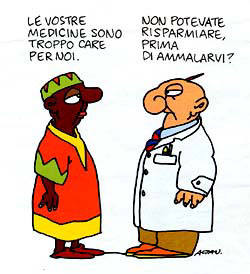| possessive adjectives and pronouns (aggettivi e pronomi possessivi)
In Italian you may indicate possession:
1. with the preposition di
2. with possessive adjectives or pronouns
Conveniently, possessive adjectives and pronouns look the same, so you only have to learn one set; adjectives, of course, go with a noun and, like in English, precede it; pronouns replace the noun. Both adjectives and pronouns must agree in gender and number with the noun they modify or replace.
mio/a
tuo/a
suo/a
nostro/a
vostro/a
loro |
miei/mie
tuoi/tue
suoi/sue
nostri/nostre
vostri/vostre
loro |
Unlike their English equivalents, Italian possessives accept the article; possessive adjectives, however, reject the article when they refer to unmodified family members in the singular. If the family member is plural or preceder by another adjective or suffix, it retains the article; mamma, papà, nonno, and nonna can go with or without an article:
Mia sorella é bella / Le mie sorelle sono belle
Mio zio é vecchio / I miei zii sono vecchi
Mia madre ha 50 anni / La mia cara madre ha 50 anni
Mi manca mia nonna / Mi manca la mia nonna
|
